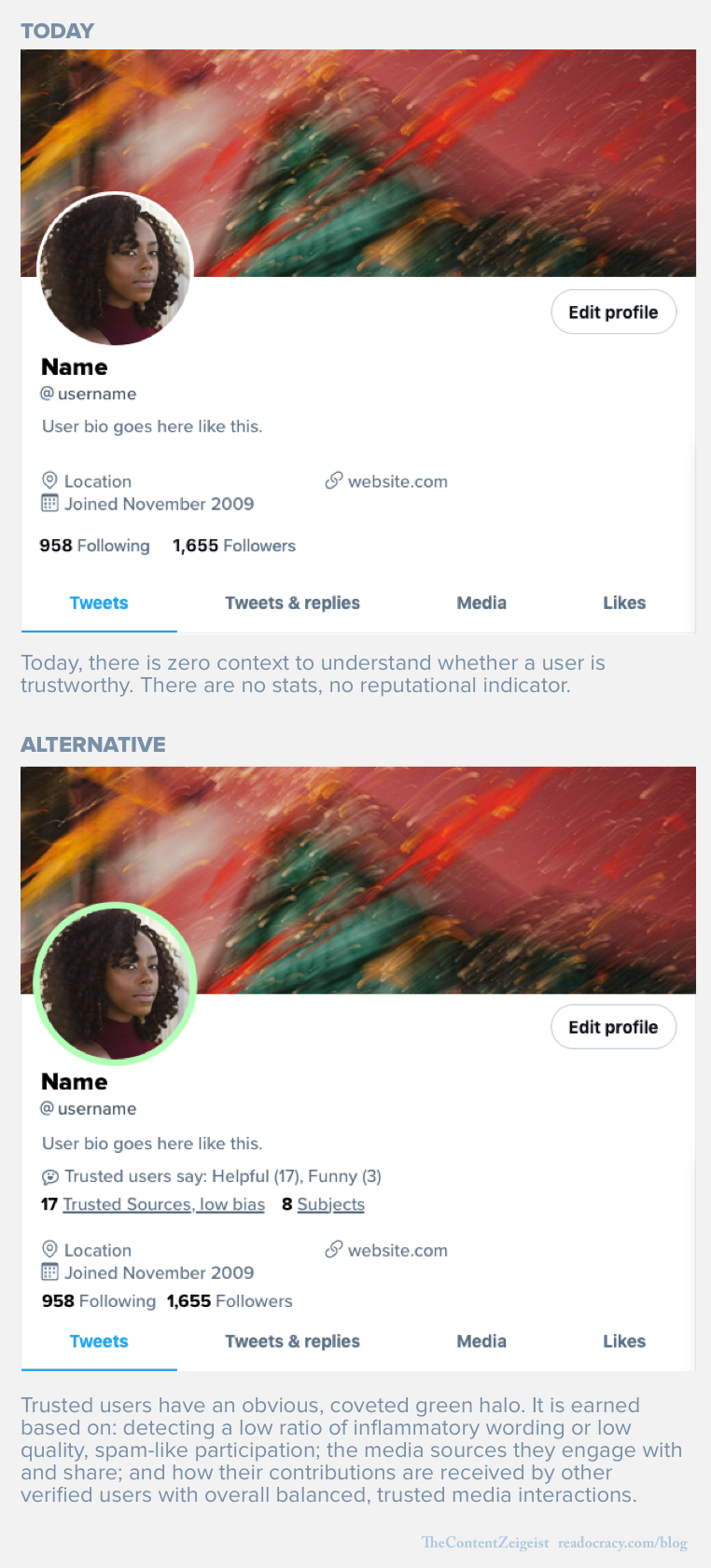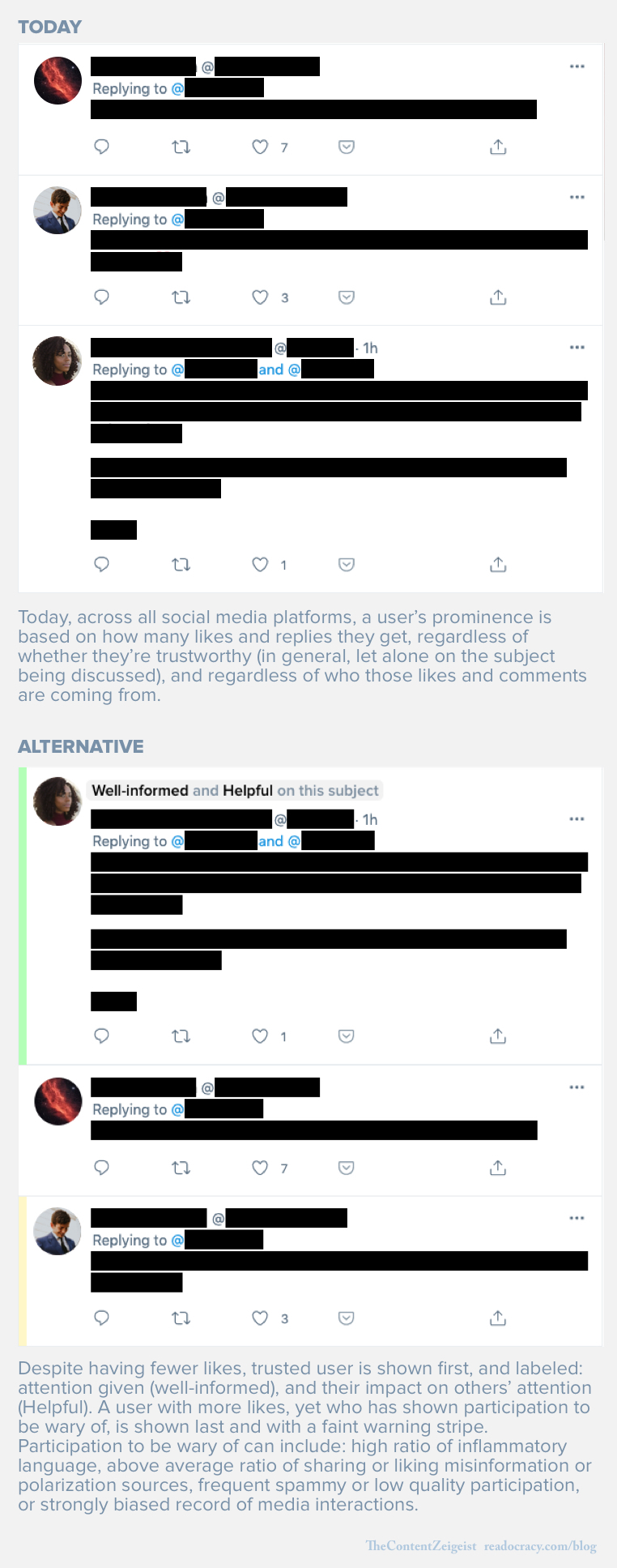The internet has become a cesspool of noise for one simple reason we all now know:
Success online is defined almost exclusively, above all else, by the amount of attention you get. Period.
The metrics tell the tale. Views, likes, shares, reactions, comments. They are all variations of one thing: how much attention did you get from others. Even follower counts show the world through the lens of others wanting to keep giving you attention. This is what the algorithm rewards, and these are the only markers we have, as a society, to gauge somebody’s social significance online.
There is no secondary type of metric. Go ahead: can you name one that doesn’t trace back to attention received, and the reactions that come with it?
The result is the world we have now. Provocateurs and con artists rise to the pinnacles of popularity and power. Our shared reality is cracking under the weight of millions of misinformation profiteers, of politicians who acquire real power through “flooding the zone”, of content that exists for the sake of existing to keep the attention vacuum humming.
So let’s flip this whole godforsaken logic upside down. What i’m about to suggest would upend the economics that incentivize the noise. It would also transform social media as we know it, introducing sanity and trust we’ve been starving for.
It’s not complicated, but it is radical. If nothing else I hope you’ll never look at the internet the same way again.

Here it is:
What if influence online was defined by the quality of attention you give, more than the quantity of attention you get?
What if the metrics and algorithms optimized for that?
Picture this. You open Twitter or Facebook.
Instead of profiles only showing the number of followers, they also show the user’s favourite sources of information, and the learning they’ve done on their favourite subjects.
Even reaction types can be shown more qualitatively. What’s your track record, especially from users who are definitely not bots or known trolls? Are you helpful?

Content sources shared are logged here. Users could also add sources manually, including annotations or summaries they can reference when needed in threads. They could also use a tracker to verify their time spent with content from their chosen sources, and include this in their log, to further prove their commitment and credibility on a subject.
You jump into a thread, and instead of the most popular reactions first, it’s the ones from the people who have the strongest knowledge on that subject: they’ve consumed the most information on the subject, from the widest variety of trusted sources; they’ve also had their comments and contributions be the most appreciated not just from the general public, but others who have read more than average on the subject being discussed.
As you scroll down the thread you see that everything is ordered based on the user’s track record with the subject. Everything is colour-coded. It goes from green, to yellow, to red.

Despite having fewer likes, shown first because of attention given (well-informed), and their impact on others' attention (Helpful)
Most of this isn’t even difficult. Aspects of it are already happening!
- There are now countless databases that help track content sources for polarization, misinformation, or inciting violence. It’s easy to label content by the source’s historical bias, and show why. Anyone can check them.
- The most egregious perpetrators of inflammation and clickbait have extremely obvious signals that are easily detected, ranging from certain headline sentence structures, the structure of content (broken into many pages), using ALL CAPS, loaded words, and more.
- It’s just as easy to detect these same characteristics and more in posts themselves. Do people have a track record of inflammatory posts?
- Twitter made headlines last year when it started limiting your ability to reshare an article if you hadn’t even clicked into it yet. There is nothing except their attention-hungry business model stopping the big platforms from expanding this.
- Twitter is already applying more contextual labels, like the one below on a gov/state-controlled news source. Imagine automatically doing this for accounts spewing content from a single source, or only from problematic sources. (Should the label be more noticeable? Yes, obviously.)

- Verifying if somebody has actually read something / how they’re informing themselves is more complicated, but we’re already tackling that too (it’s our raison d’etre).
In many ways this all would solve the raging debate around deplatforming, too, as in such a system bad actors would have minimal influence and power. It wouldn’t be so urgent to ban them in the first place.
Some people are quick to start shouting “censorship” at such ideas, but this isn’t about stopping anybody from doing anything. It’s about giving others desperately needed context before you hijack their attention. It’s rewarding how we inform ourselves, instead of how we distract others.
As the brilliant saying goes, free speech does not equal free reach. You have the right to speak, but this doesn’t also mean a right to be heard by everybody too. Nobody owes you the obligation of hearing all the things you have to say. This is what we meant when we coined the name Readocracy. It’s not deplatforming, it’s just not automatically platforming. You can enter the venue, but having the stage is earned.
Only in a world where we are so used to having our attention hijacked, exploited, and valued for pennies on the dollar, would it be automatically assumed by so many that they deserve to be seen and heard by everyone else, no matter what.
It’s the radical attention entitlement that comes with being a stockholm syndrome baby of surveillance capitalism.

Henry Ford famously said,
If I had asked people what they wanted, they would have said faster horses.
Today’s internet, and the way we reward popularity, is our foolish attempt at a faster horse for the attention economy. Offline, we can’t control what becomes popular. Things grab our attention by force, and we live with it. Online we have the unprecedented ability to filter what gets our attention. Until now, we’ve completely wasted this incredible opportunity, and in fact used it to only magnify reality’s worst attention-grabbing facets. Like a giant trojan horse for the mind.
Influence online shouldn't rely on the same principles as our distraction-prone, unfilterable reality. It’s time we took advantage of the internet’s ability to quantify, verify, and filter, and embrace a paradigm that prizes being well-informed and helpful, instead of only the amount of attention one can hoover up by any means necessary. The quality of the attention we give, instead of only the quantity of attention we get.
Basing everything only on the latter is a massive loophole we need to, and can, close. Just imagine the results. The sheer reduction in noise. The decrease in seeing uninformed, knee-jerk, pot-stirring takes. The impact of billions of people’s internal calculus shifting from mindless to mindful.
What would that do for your mind and emotions? What would it do for our society?
It’s a simple idea, but it can change everything.
 Back to Blog
Back to Blog



